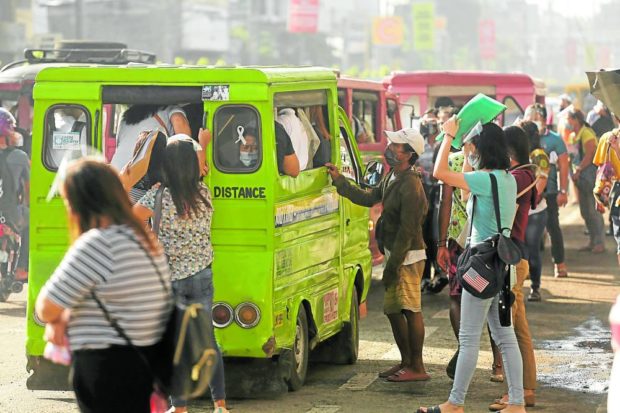1,000 jeepneys, taxis gone from Davao City roads

ELBOW-TO-ELBOW Commuters in Davao City push and shove to board public utility vehicles during rush hours in this photo taken in June 2021. —KARLOS MANLUPIG
DAVAO CITY — About 1,000 passenger vehicles have disappeared from this city’s roads since 2017, according to the regional office of the Land Transportation Franchising and Regulatory Board (LTFRB).
Based on the record of the agency, there were 7,417 public utility jeeps (PUJs), commonly known as jeepneys, in the city in 2017. But the number went down to 6,515 as of last month, or a reduction of 902 units. On taxicabs, from the high of 5,563 units in 2017, there were only 5,354 units plying the city’s streets as of the end of 2020.In all, 1,111 public utility vehicles were lost from the city’s public transport system. But on June, the agency opened 335 franchises for taxicabs and all the slots have been applied for.
However, unlike taxicabs whose application for franchise was opened, the LTFRB said that it has closed the application for passenger jeeps “pursuant to the implementation of the HPBS (High Priority Bus System) by the Davao City Government and DOTr (Department of Transportation).”
It was referring to the P19 billion project that would replace all passenger jeeps with buses to address the traffic congestion in the city. The project sought to abolish from the city’s main thoroughfares some 7,500 PUJs and replace these with 1,300 modern buses. In 2019, the National Economic and Development Authority approved the project for funding through Official Development Assistance, with the city government setting aside P2.8 billion as its counterpart.
Apart from modernizing the passenger fleets that give premium to mass transit, another key component of the project is finding alternative livelihoods for those who will be displaced.
Reduced capacity
Early this month, Mayor Sebastian Duterte met with Transportation Secretary Jaime Bautista to seek support for the project, which was initially crafted during the mayoral term of his sister, now Vice President Sara Duterte.
The loss of jeepneys and taxicabs has brought down the public transport capacity in the city.
The LTFRB noted that even those that have renewed their franchises have not been consistent in operating their units because of the impact of the COVID-19 pandemic on their livelihood as well as the movements in fuel prices, further bringing down public transport capacity.
It added that many taxis have no available drivers as they sought self-employment like in food delivery service.
To remedy the situation, the local government and the LTFRB deployed buses to augment the existing public transport capacity, especially during peak hours.
So far, four bus companies have deployed 16 buses in four routes while the Drivers United for Mass Progress and Equal Rights-Philippines Taxi Drivers Association (Dumper), the partylist of transport groups mainly in the Davao region, has deployed three buses to give free rides to students on the city’s northern route.
RELATED STORY
LTFRB announces reopening of 133 pre-pandemic, non-Edsa PUV routes














